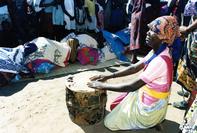Music and Dance
Important Pedi crafts include pottery, house-painting, woodworking (especially making drums), metalsmithing and beadwork. Traditional music (mmino wa setso) has a six-note scale, formerly played on a plucked reed instrument (dipela).

Today musicians use instruments such as the Jew's harp and the German autoharp (harepa), which have come to be regarded as typically Pedi. Perhaps best known is the kiba dance, which used to be rural but is now a migrant style. The men's version has an ensemble of players, each with an aluminium end-blown pipe of a different pitch (naka), producing a descending melody with rich harmonies.
Men wear kilts (harking back to Pedi involvement with the Allies in World War II) with traditional regalia. The women's version features songs (dikosa) in which individuals improvise on older lyrics. Singing and dancing kiba is one of the few occasions when women wear the smocked clothes of the kgarebe, first worn after initiation. Both men and women's kiba are accompanied by an ensemble of drums (meropa), now made of oil-drums and milk-urns.